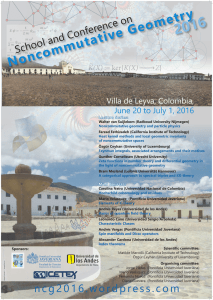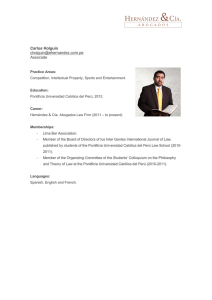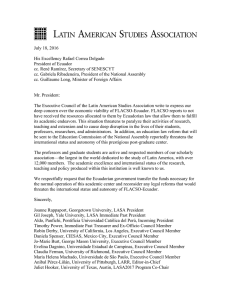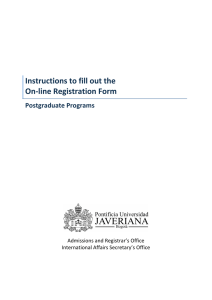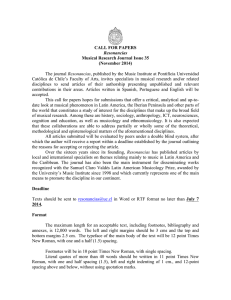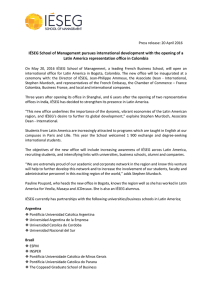China and Latin America: Strategic Partners in a Multipolar World?
Anuncio
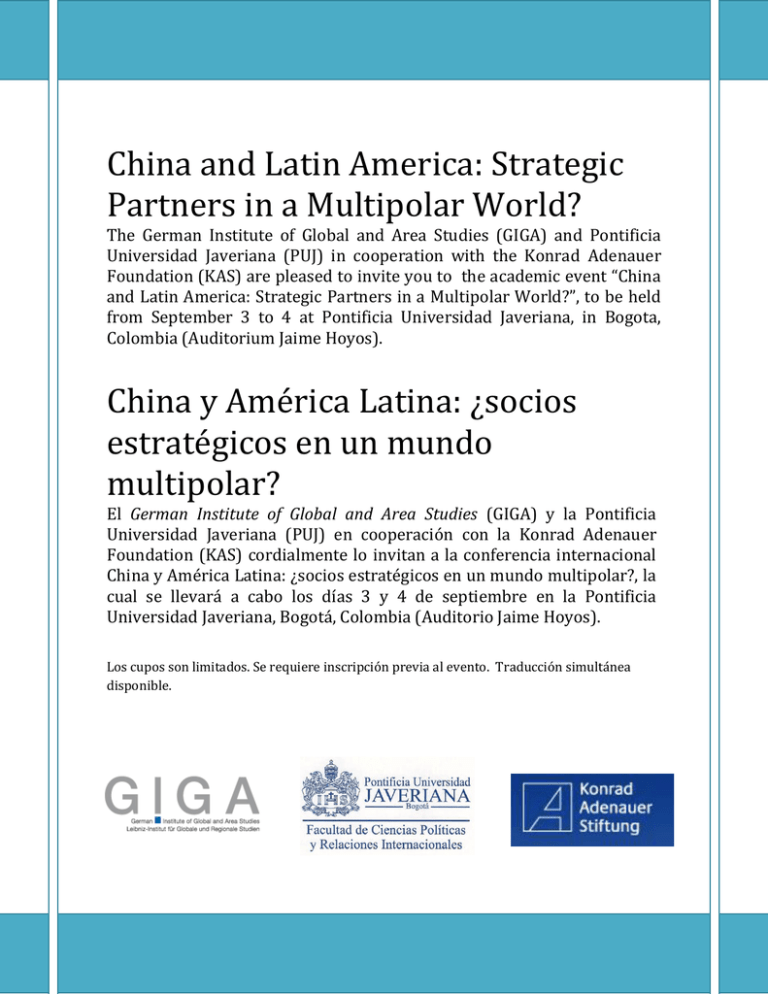
China and Latin America: Strategic Partners in a Multipolar World? The German Institute of Global and Area Studies (GIGA) and Pontificia Universidad Javeriana (PUJ) in cooperation with the Konrad Adenauer Foundation (KAS) are pleased to invite you to the academic event “China and Latin America: Strategic Partners in a Multipolar World?”, to be held from September 3 to 4 at Pontificia Universidad Javeriana, in Bogota, Colombia (Auditorium Jaime Hoyos). China y América Latina: ¿socios estratégicos en un mundo multipolar? El German Institute of Global and Area Studies (GIGA) y la Pontificia Universidad Javeriana (PUJ) en cooperación con la Konrad Adenauer Foundation (KAS) cordialmente lo invitan a la conferencia internacional China y América Latina: ¿socios estratégicos en un mundo multipolar?, la cual se llevará a cabo los días 3 y 4 de septiembre en la Pontificia Universidad Javeriana, Bogotá, Colombia (Auditorio Jaime Hoyos). Los cupos son limitados. Se requiere inscripción previa al evento. Traducción simultánea disponible. With China’s emergence as a global power, its economic ties with Latin American countries have grown significantly since the end of the 1990s. Trade, being the dominant element of economic relations between Latin American states and China, has risen twelvefold in the period from 1999 to 2008 only. Chinese foreign direct investment stocks, albeit falling far behind the expectations raised during President Hu Jintao’s visit to Brazil, Argentine, Chile and Cuba in 2004, still quintupled between 2004 and 2010 according to Chinese data. Bilateral economic ties, concentrating on countries like Argentine, Brazil, Chile, Peru and Venezuela were thus significantly intensified in the last years. In a similar vein, the Chinese government also expanded its political relations with the region: At the bilateral level, Beijing concluded strategic partnership agreements with Brazil (1993/2004), Venezuela (2001), Mexico (2003), Argentine (2004), and more recently Peru (2008). At the multilateral level, the People’s Republic of China has been a formal member in the Inter-American Development Bank (IADB) since 2009. In addition, China has been a permanent observer in the Latin American Integration Association (ALADI) and the Organization of American States (OAS) since 1994 and 2004, respectively. As a permanent dialogue partner of the Caribbean Community (CARICOM), the Andean Community (CAN) and the Southern Common Market (MERCOSUR) Beijing has further expanded its channels to the region’s main integration associations. Beyond the region, China cooperates with a number of Latin American and other extraregional states through bi-regional and global foreign policy networks (e.g., FOCOLAE, BRICS, G8+5, G77). The aim of this conference is to further international academic debate on these issues. The conference will bring together renowned experts on Sino-Latin American and South-South relations from Latin America, China, the US and Europe in Bogotá. The conference focus lies on the political dimensions of the economic relations between China and Latin America and the reactions on China’s growing regional activism by extra-regional major powers present in Latin America. In particular, the panels will analyze how “strategic partnerships” within the region as well as various multilateral forms of cooperation help the involved actors to influence the outcomes of international bargaining processes (e.g. in the UN, WTO) according to national objectives through the coordination of policies and with other states. In a broader perspective, the conference seeks to contribute to our understanding of how global South-South cooperation shapes the distribution of power in multipolar politics at the beginning of the 21st century. Septiembre, 3, 2012 8:30 AM Charla de apertura (Keynote speech) ¿Between the Washington Consensus and the Chinese model? Matt Ferchen (Tsinghua University) Panel 1 China and Latin America: Economic Relations and beyond? 9:00AM12:00M Moderador: Eduardo Velosa Porras (Pontificia Universidad Javeriana) China’s free trade strategy in Latin America and the Pacific Alliance Leslie Wehner (GIGA) Attraction of foreign investment: the Colombian strategy to intensify trade relations with China Angélica Guerra-Barón (Pontificia Universidad Javeriana) Receso (coffee break) China, Central America and/or the Caribbean: More than trade relations? Francisco Haro Navejas (Universidad de Colima) Chile (and Peru): Beyond Mining and Metals? Martín Perez Le-Fort (Universidad de Chile) Preguntas y respuestas (Q&A, 20 mins.) Almuerzo libre Panel 2 The Strategic Partners: Influencing Regional and Global Politics? 3:00PM6:00 PM Moderador: Georg Strüver (GIGA) China’s bilateral partnership strategy in South America: Regional Approach and the case of Venezuela Ana Soliz (GIGA) Foreign policy coordination: is there room for a strategic partnership between Colombia and China? Eduardo Velosa Porras (Pontificia Universidad Javeriana) Receso (coffee break) Emerging powers: ¿competition or cooperation with China? Niu Haibin (Shanghai Institute for International Studies) Contents and mechanisms of strategic China’s partnerships: Mexico Sun Hongbo (Institute of Latin America Studies Chinese Academy of Social Sciences, CASS; visiting scholar at the Institute of Economic Research, UNAM) Preguntas y respuestas (Q&A, 20 mins.) Septiembre, 4, 2012 Panel 3 Multilateral Strategies of Political Engagement between China and Latin American Countries: Securing only regional operating range? 9:00AM12:00M Moderadora: Angélica Guerra-Barón (Pontificia Universidad Javeriana) China and Latin America in Global Politics: Foreign Policy Alignment and UN voting Georg Strüver (GIGA) Cooperation through Global Policy Networks: Trade issues Gonzalo Sebastian Paz (George Washington University) Receso (coffee break) Changing Weather: China's Role in Latin America's Climate Change Policy Ralf Leiteritz (Universidad el Rosario) China and Latin America in Global Norm Building: International law and the ICC Nele Noesselt (GIGA) The One Broad Brush? Latin America in Chinese Foreign Policy Benjamin Creutzfeldt (Externado University of Colombia) Preguntas y respuestas (Q&A, 20 mins.) Almuerzo libre Panel 4 South-South Cooperation vs. North-South-Relations: Traditional Partners of Latin America in Retreat? Moderador: Daniel Flemes (GIGA) The Latin America-China Relations in the World Geopolitical Chessboard Benjamín Herrera (Pontificia Universidad Javeriana) The U.S. vision of China’s Relations towards Latin America Detlef Nolte (GIGA) Receso (coffee break) ¿Is there a Chinese agenda in the Colombian conflict? Victor De Currea-Lugo (Pontificia Universidad Javeriana) Chinese perspectives through Latin American eyes media: 2001-2011 Vladimir Rouvinski (ICESI) Preguntas y respuestas (Q&A, 20 mins.) 3:00PM6:00 PM Para mayor información e inscripción previa al ingreso, favor comunicarse con: Yovana Leal Correo electrónico: yovana.leal@javeriana.edu.co Asunto: Evento China y América Latina Departamento de Relaciones Internacionales Facultad de Ciencias Políticas y Relaciones Internacionales Pontificia Universidad Javeriana PBX: (57-1) 3208320 Ext. 2504 Cra 7 No 40-62 Edif. 9 Bogotá D.C., Colombia KAS – Coordinación de Proyectos Fundación Konrad Adenauer - KAS Colombia Calle 90 Nº 19C - 74, piso 2 Tel.: +571 743 09 47 Ext 207 kascolombia@gmail.com O puede acceder al siguiente enlace: www.kas.de/kolumbien
